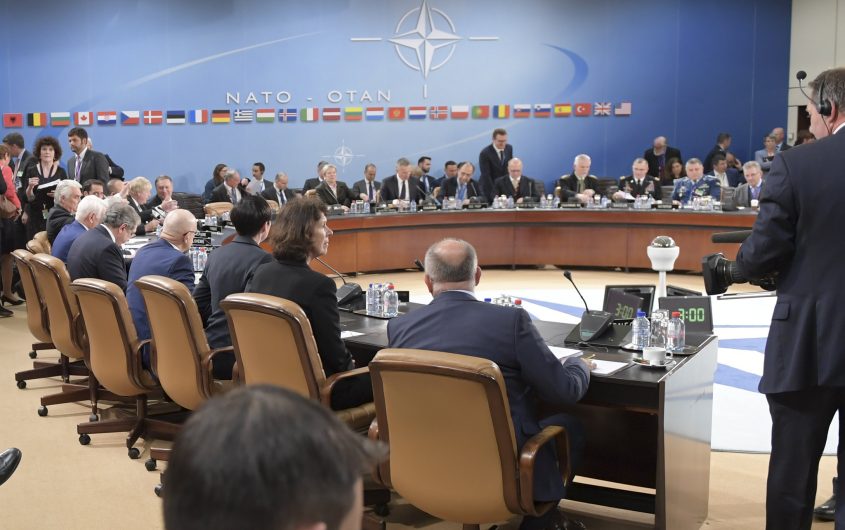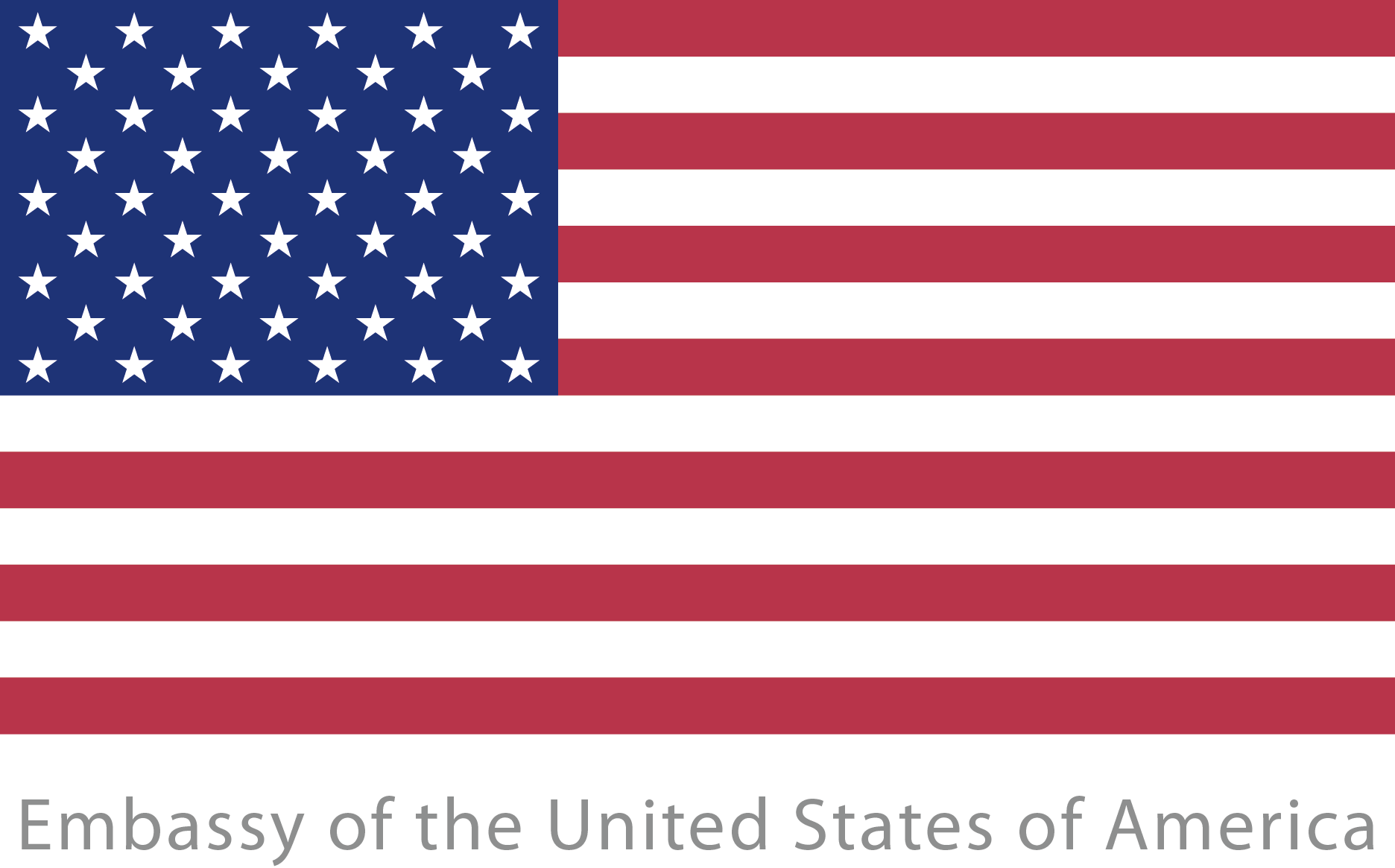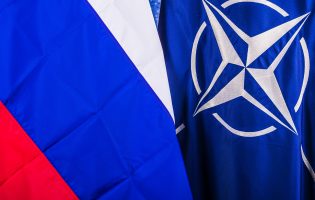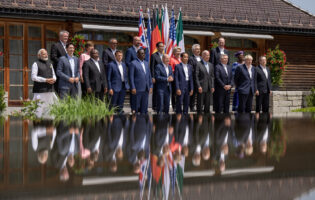
U.S. Department of State via Flickr
Towards a Revitalized Transatlantic Security Community
Keynote Remarks by:
Michael Murphy, Deputy Assistant Secretary for European & Eurasian Affairs, U.S. Department of State
followed by a panel discussion with American, German, and European experts:
Andrea Kendall-Taylor, Senior Fellow and Director, Transatlantic Security Program, Center for a New American Security
Carlo Masala, Professor of International Politics, University of the Bundeswehr
Alice Pannier, Research Fellow, Head of Geopolitics of Technology Program, French Institute of International Relations (IFRI)
Moderated by: Jeff Rathke, President, American-German Institute
The transatlantic community faces pressing security challenges but can rely on powerful institutions and relationships to promote shared security. The Biden administration has defined the goal of adapting and renewing its alliances to deal not only with military threats but also non-military threats. How should the United States and Europe ensure they will lead in innovation, and how can they develop their ability to counter economic coercion and technological vulnerabilities together? How will the European Union, NATO, and other transatlantic institutions have to adapt in order to contribute to modern transatlantic security? This webinar will shed light on the top priorities on the transatlantic security agenda and consider the specific actions that Germany, the United States, and European partners should undertake to meet these challenges.
Michael J. Murphy, a 29-year veteran of the U.S. Foreign Service, assumed his responsibilities as Deputy Assistant Secretary of State for European & Eurasian Affairs in June 18, 2018. He oversees European security, including NATO, the OSCE, and conventional arms control, Northern Europe, including the United Kingdom, Ireland, and the Nordic and Baltic countries, as well as Arctic Security. Michael holds the rank of Minister Counselor.
From February 18 until September 1, 2019, Michael served as Acting Principal Deputy Assistant Secretary of State for European and Eurasian Affairs.
Immediately prior to his current posting, from 2017-2018, Michael served as Director of the Office for European Security & Political-Military Affairs in the Bureau of European & Eurasian Affairs. He served as the Associate Dean of the Leadership and Management School at the National Foreign Affairs Training Center from 2015-2017.
Michael served as Deputy Chief of Mission at the U.S. Embassy in Gaborone, Botswana, from 2012-2015 and as Chargé d’Affaires, a.i., in Botswana from February 2014 to January 2015. He served as Deputy Chief of Mission at the U.S. Embassy in Pristina, Kosovo, from 2009 to 2012. Prior to his posting in Kosovo, Michael served for three years as Political Counselor at the U.S. Embassy in Sarajevo, Bosnia-Herzegovina.
Michael’s other overseas postings include London, United Kingdom; Yaoundé, Cameroon; and Lagos, Nigeria. In Washington, DC, Michael served as the Chief of Staff to both the Assistant Secretary of State for European & Eurasian Affairs and the Director General of the Foreign Service as well as Desk Officer for Bulgaria and for the North Atlantic Treaty Organization.
Michael’s Foreign Service career included tenure in the Trans-Atlantic Fellowship Program through which U.S. diplomats serve in the Ministries of Foreign Affairs of allied governments. He served from 2001-2002 in the United Kingdom’s Foreign and Commonwealth Office as Office Director for Ukraine, Moldova and Belarus.
Prior to joining the Foreign Service in 1991, Michael worked in the U.S. Congress for three years as the Senior Legislative Aide to Congresswoman Marilyn Lloyd of Tennessee with responsibility for international affairs and defense issues. He is a Phi Beta Kappa graduate of Hamilton College with a Bachelor of Arts degree in International Relations.
Andrea Kendall-Taylor is a Senior Fellow and Director of the Transatlantic Security Program at the Center for a New American Security (CNAS). She works on national security challenges facing the United States and Europe, focusing on Russia, authoritarianism and threats to democracy, and the state of the Transatlantic alliance. Prior to joining CNAS, Andrea served for eight years as a senior intelligence officer. From 2015 to 2018, she was Deputy National Intelligence Officer for Russia and Eurasia at the National Intelligence Council (NIC) in the Office of the Director of National Intelligence (DNI). In this role Andrea led the U.S. intelligence community’s strategic analysis on Russia, represented the IC in interagency policy meetings, provided analysis to the National Security Council, and briefed the DNI and other senior staff for White House and international meetings. Prior to joining the NIC, Andrea was a senior analyst at the Central Intelligence Agency (CIA) where she worked on Russia and Eurasia, the political dynamics of autocracies, and democratic decline. Andrea is an adjunct professor at Georgetown University’s School of Foreign Service. Her work has been published in numerous political science and policy journals, including the Journal of Peace Research, Democratization, Journal of Democracy, Foreign Affairs, the Washington Post, the Washington Quarterly, and Foreign Policy. Andrea received her B.A. in politics from Princeton University and her Ph.D. in political science from the University of California, Los Angeles. She was a Fulbright scholar in Azerbaijan and Kazakhstan, where she conducted dissertation research on oil and autocracy.
Prof. Dr. Carlo Masala studied political science, German and Romance philology at the Universities of Cologne and Bonn from 1988-1992. In 1996 he received his doctorate with a thesis on German-Italian relations in the years 1963 to 1969 and in December 2002 he was awarded the venia legendi for political science. After a substitute professorship in the 2003 summer term at the Geschwister-Scholl-Institut of the Ludwig Maximilians University in Munich, he moved to the NATO Defense College in Rome at the beginning of 2004, where he worked in the research department there, initially as a research advisor and from 2006 as deputy director. Visiting professorships and research stays in the last ten years have taken him to the United States (Ann Arbor, Chicago, Washington, Monterey), Great Britain (Shrivenham), Slovakia (Matje Belt University), Italy (Rome and Florence) and the Eastern Mediterranean University in Cyprus. In March 2007 he was offered the professorship for international politics at the University of the Federal Armed Forces in Munich, which he accepted on July 1, 2007. Prof. Masala is co-editor of the magazine for politics (ZfP), the magazine for international relations (ZIB) and the magazine for strategic analyzes (ZfSA). He is also a member of the scientific advisory board of the Federal Academy for Security Policy, the NATO Defense College and the Clausewitz Society.
Alice Pannier joined Ifri in October 2020 to launch the Geopolitics of Technology program, after being an Associate Research Fellow since 2019. From 2017 to 2020, she was Assistant Professor of International Relations and European Studies at the Paul H. Nitze School of Advanced International Studies (SAIS) at Johns Hopkins University in Washington, DC. Previously, she was a postdoctoral researcher at the Institute of strategic research (IRSEM) at the French ministry of armed forces.
Alice Pannier is a graduate of King’s College London and Panthéon-Sorbonne University and holds a doctorate in political science from Sciences Po Paris, co-supervised with King’s College. She is the author of Rivals in Arms: The Rise of UK-France Defence Relations in the 21st Century (McGill-Queen’s University Press, October 2020) and co-author, with Olivier Schmitt, of French Defence Policy since the End of the Cold War (Routledge, February 2021).
This webinar will convene via Zoom. Please contact Ms. Elizabeth Caruth at ecaruth@aicgs.org with any questions.
This webinar is supported by the United States diplomatic mission in Germany.








